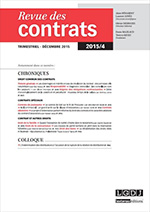The French Contract Law Reform: a Source of Inspiration?
Données bibliographiques / Bibliografische Daten | |
|---|---|
| Auteurs / Autoren: | STIJNS, SOPHIE (ED.); JANSEN, SANNE (ED.) |
| Source / Fundstelle: | Intersentia |
| Année / Jahr: | 2016 |
| Catégorie / Kategorie: | Droit civil |
| Mots clef / Schlagworte: | DOMMAGES ET INTERETS, REDUCTION DU PRIX, REFORME, réforme du droit des obligations, Théorie de l‘imprévision |
 Book description:
Book description:
The French projet d'ordonnance, which reformed contract law, the general regime of obligations and the proof of obligations appeared in February 2015. One year later, in February 2016, the final version of the ordonnance was published. The ordonnance thoroughly reforms French contract law and the law of obligations and will enter into force in October 2016.
This book results from the Contract Law Workshop of the 20th Ius Commune Conference held 26-27 November 2015. The theme of this Workshop was: 'The French Contract Law Reform: a Source of Inspiration?' Since the conference in November 2015, all authors have incorporated comments on the final version of the ordonnance.
Whereas Van Loock briefly sketches the antecedents and the outcome of the reform, the other authors each tackle specific topics of the reform that surprised and/or excited the legal community. Pannebakker tackles the precontractual phase and assesses the attractiveness of the reform for international commercial transactions. Peeraer gives a critical overview of the doctrine of nullity in the ordonnance. Leone explores the potential impact of the 'significant imbalance' test in the new ordonnance on employment contracts. In their contributions, Lutzi and Oosterhuis discuss the much-debated provision that introduces the theory of imprévision. The contributions by Jansen and Verkempinck are both focused on remedies: the newly introduced price reduction remedy and damages. Storme criticises the new rules on set-off in the ordonnance, and Mahé addresses the question why the final version of the ordonnance omitted the issue of interpersonal effects of fundamental rights on contractual freedom.
Contributions:
- Sander Van Loock - The Reform of the French Law of Obligations: How Long will the Belgians Remain Napoleon's Most Loyal Subjects?
- Ekaterina Pannebakker - Pre-Contractual Phase: Reflections on the Attractiveness of the New French Rules for the Parties to International Commercial Transactions
- Frederik Peeraer - Nullity in the Ordonnance
- Candida Leone - A Tale of Novelty and Continuity: Exploring the Future Judicial Control of Employment Contracts in the French Contract Law Reform
- Tobias Lutzi - Introducing Imprévision into French Contract Law - A Paradigm Shift in Comparative Perspective
- Janwillem (Pim) Oosterhuis - Commercial Impracticability and the Missed Opportunity of the French Contract Law Reform: Doctrinal, Historical and Law and Economics Argument - Comment on Lutzi's Introducing Imprévision into French Contract Law
- Sanne Jansen - Price Reduction unter the French Contract Law Reform
- Brecht Verkempinck - The Measure of Damages in the French Contract Law Reform - Lessons from far more Inspiring Systems
- Matthias E. Storme - Set-off in the French Reform of the Law of Obligations: a Tale of Missed Opportunities?
- Chantal Mahé - Fundamental Rights in the French Contract Law Reform



